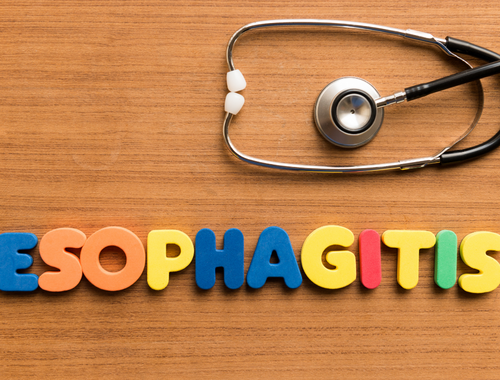Gastritis is the irritation or inflammation of the innermost, mucosal layer of the stomach. It can either be chronic or acute gastritis. Esophagitis is the inflammation of the esophagus. Esophagus is a muscular tube-like organ that connects the stomach with the mouth.

What is Gastritis?
Introduction
When the lining of the stomach is irritated, eroded, or inflamed due to an external trigger factor, it is known as gastritis. Gastritis can be of two types: acute, which causes sudden and intense pain, and chronic, which causes symptoms for a long time and increases gradually.
Pathophysiology
The stomach is lined internally by a mucosal wall that releases gastric juices to aid in digestion. Sometimes, conditions like unhealthy eating habits, alcohol, NSAIDs, or other conditions contribute to excess acid production which leads to damage in the mucosal wall, causing Gastritis.
Symptoms
It can either be asymptomatic or different individuals present with different symptoms. Some of the common symptoms are:
- Nausea accompanied by an upset stomach
- Constant bloating
- Unable to digest food properly
- Pain in epigastrium
- Episodes of vomiting
- Heartburn
- Significant decrease in appetite
- Stools can be black/tarry in color
Causes
The few common causes of gastritis are:
- Acid reflux due to conditions like GERD (Gastrointestinal regurgitation disease)
- Alcohol abuse
- Some medications like NSAIDs (Non-steroidal Anti-inflammatory Drugs)
- Taking too much stress
- A bacterium called Helicobacter Pylori.
Diagnosis
- Upper GIT endoscopy
- Blood test
- Biopsy
- Stool test
- H. Pylori breath test
Prevention and Treatment
A healthy lifestyle is key to preventing gastritis and other GIT-related illnesses.
Treatment options are:
- Medications like antacids, proton pump inhibitors, and H2 blockers can be used to minimize the production of gastric acids.
- Reducing stress levels through a healthy lifestyle, stress-releasing maneuvers, and taking antianxiety medications.
- Reducing the intake of spicy food.
- Limiting dairy if lactose intolerance is the underlying cause
- Antibiotics therapy if H. Pylori is detected.

What is Esophagitis?
Definition
Inflammation of the esophagus is known as esophagitis. Esophagus is a muscular tube-like structure that connects the oral cavity with the stomach and is responsible for the transport of food from the mouth to the stomach.
Causes
- GERD causes Reflux esophagitis due to the frequent reflux of acid from the stomach;
- Eosinophilic esophagitis is caused by eosinophilic infiltration in the esophagus, due to food allergies like soy, wheat, gluten, nuts, etc.
- Certain medications like NSAIDs, quinidine, tetracycline, and other antibiotics.
- Viral and bacterial infections
- Fungal infections especially one caused by candida albicans can cause esophagitis
- Heavy smoking
- Obesity
- Large portions of high-cholesterol food
Symptoms
- Heartburn and acidity
- Pain in chest
- Pain in throat
- Nausea and vomiting
- Dysphagia (difficulty in food swallowing)
- Regurgitation of acid in the mouth from the throat
- Impaction of food in the esophagus
- Pain in food swallowing
Diagnosis
- Barium swallow x-ray
- Histopathology
- Upper GIT endoscopy
Treatment
Treatment options of esophagitis are
- Management through lifestyle changes like smaller meal portions, not lying down immediately after meals, and eating at least 2-3 hours before bedtime.
- Taking antacids to counter GERD.
- H-2 and proton pump inhibitors
- Avoid spicy and sour foods.
- Avoid excessive alcohol and smoking.
Table Comparing Gastritis and Esophagitis

Summary of Comparison between Gastritis and Esophagitis
- Gastritis is the inflammation of the innermost mucosal layer of the stomach while esophagitis is the inflammation and irritation of the inner layer of the muscular tube known as the esophagus.
- Gastritis is caused by the bacteria Helicobacter pylori, excessive smoking or alcoholism, NSAIDS, and stress. Esophagitis is caused by GERD (gastroesophageal reflux disease), allergy to foods like nuts, soy, wheat, gluten, etc, medications like tetracyclines, doxycycline, antihypertensives, etc and excessive acidic and alcoholic beverages.
- Gastritis is diagnosed by endoscopy and blood tests. Esophagitis is diagnosed by upper GIT endoscopy, barium swallow x-ray, and histopathology.
- Gastritis pertains to the stomach while esophagitis refers to the muscular tube that acts as a carrier bridge between the stomach and the mouth, the esophagus.
FAQs
How is gastritis and esophagitis treated?
Lifestyle changes like small meal portions, taking dinner at least 2-3 hours before bedtime, avoiding spicy food, and medications like antacids, proton pump inhibitors, H-2 blockers, etc can be used to treat gastritis and esophagitis.
What are gastritis and Oesophagitis?
Gastritis is the inflammation of the stomach and esophagitis is the inflammation of the esophagus.
What does esophagitis pain feel like?
Esophageal pain feels like a sharp, stabbing pain below the rib.
How do you rule out esophagitis?
Endoscopy is the gold standard to confirm the diagnosis of esophagitis. Barium swallow and biopsy can also be used to rule out esophagitis.
How long does it take gastritis and esophagitis to heal?
It can take somewhere between 1 week to 3 weeks to treat gastritis and esophagitis.
Does esophagitis ever heal?
With lifestyle changes, management of GERD, and regular medication, esophagitis can be completely cured.
Should I be worried about esophagitis?
Esophagitis should be treated before it leads to life-threatening conditions like internal bleeding, and vomiting blood.
What foods soothe esophagitis?
Green herbal tea, non-dairy milk, or yogurt are some of the foods that soothe esophagitis.
What is the most common cause of esophagitis?
GERD (gastroesophageal reflux disease) is the most common cause of esophagitis.
- Difference Between Cystocele and Rectocele - September 8, 2023
- Comparison Between DHEA and DHEA Sulfate - September 1, 2023
- Difference Between Osteoporosis and Osteopenia - June 14, 2023

